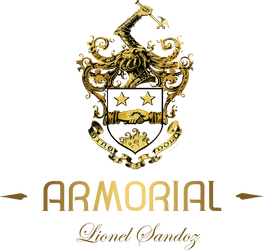DESCRIPTION
GIUDICELLI
Corse
France
- Famille noble originaire de Montemaggiore, Occi, Olmi-Cappella.
Armoiries :
" D'argent a un oiseau tenant dans son bec ... accompagné d'une étoile dans l'angle dextre du chef. "
- Couronne de comte ancienne.
Ces armoiries ont été prises sur un cachet, les couleurs ne sont pas indiquées et il est impossible de définir l'objet qui pend du bec de l'oiseau.
Famille originaire de Montemaggiore. Issue, d'apres la tradition, d'un comte Giudicello, de Calvi. Qualification de "nobilissimi" dans les actes paroissiaux.
La famille GIUDICELLI d'Olmi-Cappella a aussi porté :
" D'argent a un arbre de sinople soutenu par deux lions de sable et accosté de deux pins de sinople, le tout sur une terrasse du meme. "
- (D'apres un cachet.)
- La famille GIUDICELLI de Centuri porte:
" D'azur au lion d’or posé sur une terrasse de sable. "(Preuves pour l’ordre de Malte. Bibliothèque de l'Arsenal, Paris.)
- Armes primitives des Napollon (Sanason Napollone, fils de GIUDICELLI de Centur, chargé d'affaires de Richelieu en Orient (Histoire de la Corse, par Colonna de Cesari Rocca, 1890.)
Note historique et biographique:
Le Comte GIUDICELLO est l'ancêtre de la famille GIUDICELLI d’Occi, en Balagne, au XVe siècle.
Autrefois, cette famille GIUDICELLI était appelée "i gentilhuomi della Cappella".
Pietro GIUDICELLI fut Podestat d’Olmi-Cappella en 1565.
Giacomo Antonio GIUDICELLI, Curé Doyen de Mausoléo, mourut en fonctions en 1643.
Alessandro GIUDICELLI suivit des études de médecine et de chirurgie à Rome en 1764-65.
Pierre GIUDICELLI, initialement Juge de Paix du canton de Tenda au début de la Révolution, devint ensuite Député de la piève de Giussani au Parlement anglo-corse. En 1797, il fut contraint de fuir en Italie pour échapper aux persécutions républicaines. Amnistié en 1803, il rentra en Corse et s’inscrivit au barreau des avocats du Tribunal de Calvi. Sous la Restauration, il fut nommé Juge au même tribunal.
Son frère, Nicolas GIUDICELLI, patriote corse, fut reçu docteur à la faculté de Pise, avec des certificats délivrés par Francesco et Andrea Vacca Berlinghieri, le 20 mai 1801. Il fit ses études pendant l’émigration. Amnistié en 1803, il revint s’établir dans son village natal.
François Antoine GIUDICELLI, dit Tiodo, médecin, fut élu Conseiller Général d’Olmi-Cappella en 1848. Il est décédé en 1891.
François-Marie GIUDICELLI (de la famille des Scialoni), Juge d’Instruction à Perpignan, est décédé en 1871.
Grièvement blessé à Montdidier, le Capitaine Alexandre GIUDICELLI est mort à l’hôpital de Beauvais le 1er août 1918.
Le Sous-lieutenant Jean GIUDICELLI est tombé au combat devant Verdun en 1916.
Origine et étymologie:
Le nom de famille "GIUDICELLI" est d'origine italienne, principalement trouvé en Corse et en Italie.
Il dérive probablement du mot italien "GIUDICE", qui signifie "juge".
"GIUDICELLI" pourrait donc être un nom de famille dérivé de l'occupation de juge ou être lié à une personne qui était associée à des fonctions judiciaires ou à des responsabilités semblables dans le passé.
Symbolique des armoiries:
- " D'argent a un oiseau tenant dans son bec..." - " D'argent " signifie que le fond du blason est argenté, c'est-à-dire blanc. L'oiseau tenant quelque chose dans son bec peut symboliser la communication, le messager, ou même la prédation, selon l'espèce d'oiseau et l'objet qu'il tient.
- "...accompagné d'une étoile dans l'angle dextre du chef." - Cela décrit un autre élément du blason, situé dans l'angle supérieur droit (dextre) du chef (la partie supérieure du blason). Une étoile peut représenter la lumière, la vérité, la guidance ou même la destinée.
Sources héraldiques et biographiques:
- Armorial Corse par Colonna de Cesari Rocca, 1892.
- Nouvel Armorial Corse. Livre d'or de la noblesse, par Jean-Christophe Orticoni, 1992.
- Armorial de la Corse par François Demartini, 2000.
____________________________________________________
GIUDICELLI
Corsica
Francia
Famiglia nobile originaria di Montemaggiore, Occi, Olmi-Cappella.
Stemmi:
" D'argento a un uccello tenente nel becco ... accompagnato da una stella nell'angolo destro del capo."
- Corona di conte antica.
Questi stemmi sono stati presi da un sigillo, i colori non sono indicati ed è impossibile definire l'oggetto che pende dal becco dell'uccello.
Famiglia originaria di Montemaggiore. Secondo la tradizione, discende da un conte Giudicello, di Calvi. Qualificata come "nobilissimi" negli atti parrocchiali.
La famiglia GIUDICELLI di Olmi-Cappella ha portato anche:
" D'argento a un albero di verde sostenuto da due leoni di nero e accostato da due pini di verde, il tutto su una terrazza dello stesso."
(Secondo un sigillo.)
La famiglia GIUDICELLI di Centuri porta:
" D'azzurro al leone d’oro posato su una terrazza di nero. "(Prove per l'ordine di Malta. Biblioteca dell'Arsenale, Parigi.)
- Armi primitive dei Napollon (Sanason Napollone, figlio di GIUDICELLI di Centur, incaricato d'affari di Richelieu in Oriente (Storia della Corsica, di Colonna de Cesari Rocca, 1890.)
Note storiche e biografiche:
Il Conte GIUDICELLO è l'antenato della famiglia GIUDICELLI di Occi, in Balagna, nel XV secolo.
In passato, questa famiglia GIUDICELLI era conosciuta come "i gentiluomini della Cappella". Pietro GIUDICELLI fu Podestà di Olmi-Cappella nel 1565.
Giacomo Antonio GIUDICELLI, Arciprete Decano di Mausoléo, morì in carica nel 1643.
Alessandro GIUDICELLI studiò medicina e chirurgia a Roma nel 1764-65.
Pietro GIUDICELLI, inizialmente Giudice di Pace del cantone di Tenda all'inizio della Rivoluzione, divenne poi Deputato della pieve di Giussani nel Parlamento anglo-corse. Nel 1797, fu costretto a fuggire in Italia per sfuggire alle persecuzioni repubblicane. Amnistiato nel 1803, tornò in Corsica e si iscrisse all'ordine degli avvocati del Tribunale di Calvi. Durante la Restaurazione, fu nominato Giudice presso lo stesso tribunale.
Suo fratello, Nicolas GIUDICELLI, patriota corso, conseguì il dottorato presso la facoltà di Pisa, con certificati rilasciati da Francesco e Andrea Vacca Berlinghieri, il 20 maggio 1801. Studiò durante l'emigrazione. Amnistiato nel 1803, tornò a stabilirsi nel suo villaggio natale.
François Antoine GIUDICELLI, detto Tiodo, medico, fu eletto Consigliere Generale di Olmi-Cappella nel 1848. Morì nel 1891.
François-Marie GIUDICELLI (della famiglia dei Scialoni), Giudice Istruttore a Perpignano, morì nel 1871. Gravemente ferito a Montdidier, il Capitano Alexandre GIUDICELLI morì all'ospedale di Beauvais l'1 agosto 1918.
Il Sottotenente Jean GIUDICELLI cadde in combattimento davanti a Verdun nel 1916.
Origine ed etimologia:
Il cognome "GIUDICELLI" è di origine italiana, principalmente trovato in Corsica e in Italia.
Probabilmente deriva dalla parola italiana "GIUDICE", che significa "giudice".
"GIUDICELLI" potrebbe quindi essere un cognome derivato dall'occupazione di giudice o essere collegato a una persona che era associata a funzioni giudiziarie o responsabilità simili in passato.
Simbolica dello stemma:
- " D'argento a un uccello tenente nel becco ..." - "D'argento" indica che lo sfondo dello stemma è argenteo, cioè bianco. L'uccello che tiene qualcosa nel becco può simboleggiare la comunicazione, il messaggero, o anche la predazione, a seconda della specie di uccello e dell'oggetto che tiene.
" accompagnato da una stella nell'angolo destro del capo " - Questo descrive un altro elemento dello stemma, situato nell'angolo superiore destro (dextre) del capo (la parte superiore dello stemma). Un' stella può rappresentare la luce, la verità, la guida o persino il destino.
Fonti araldiche e biografiche:
- Araldica Corsa di Colonna de Cesari Rocca, 1892.
- Nuovo Araldica Corsa. Libro d'oro della nobiltà, di Jean-Christophe Orticoni, 1992.
- Araldica della Corsica di François Demartini, 2000.
____________________________________________________
GIUDICELLI
Corsica
France
Noble family originating from Montemaggiore, Occi, Olmi-Cappella.
Coat of Arms:
" Silver, with a bird holding in its beak ... accompanied by a star in the dexter chief."
- Ancient count's crown.
These arms were taken from a seal, the colors are not indicated, and it is impossible to define the object hanging from the bird's beak.
Family originating from Montemaggiore. According to tradition, descended from a Count Giudicello, of Calvi. Referred to as "nobilissimi" in parish records.
The GIUDICELLI family of Olmi-Cappella also bore:
" Silver with a tree vert supported by two lions sable and flanked by two pines vert, all on a terrace of the same."
(According to a seal.)
The GIUDICELLI family of Centuri bears:
" Azure with a lion or on a terrace sable." (Evidence for the Order of Malta. Arsenal Library, Paris.)
- Primitive arms of the Napollon family (Sanason Napollone, son of GIUDICELLI of Centuri, chargé d'affaires of Richelieu in the Orient (History of Corsica, by Colonna de Cesari Rocca, 1890.)
Historical and Biographical Note:
Count GIUDICELLO is the ancestor of the GIUDICELLI family from Occi, in Balagne, in the 15th century.
Formerly, this GIUDICELLI family was known as "i gentilhuomi della Cappella".
Pietro GIUDICELLI was the Podestà of Olmi-Cappella in 1565.
Giacomo Antonio GIUDICELLI, Dean Curate of Mausoléo, died in office in 1643.
Alessandro GIUDICELLI studied medicine and surgery in Rome in 1764-65.
Pierre GIUDICELLI, initially a Justice of the Peace for the canton of Tenda at the beginning of the Revolution, later became a Deputy of the pieve of Giussani in the Anglo-Corsican Parliament. In 1797, he was forced to flee to Italy to escape republican persecutions. Granted amnesty in 1803, he returned to Corsica and enrolled in the bar association of the Court of Calvi. During the Restoration, he was appointed as a Judge at the same court.
His brother, Nicolas GIUDICELLI, a Corsican patriot, received his doctorate at the University of Pisa, with certificates issued by Francesco and Andrea Vacca Berlinghieri, on May 20, 1801. He pursued his studies during emigration. Amnestied in 1803, he returned to settle in his native village.
François Antoine GIUDICELLI, known as Tiodo, a physician, was elected General Counselor of Olmi-Cappella in 1848. He died in 1891.
François-Marie GIUDICELLI (from the Scialoni family), an examining magistrate in Perpignan, died in 1871.
Seriously wounded at Montdidier, Captain Alexandre GIUDICELLI died at Beauvais Hospital on August 1, 1918.
Second Lieutenant Jean GIUDICELLI fell in combat near Verdun in 1916.
Origin and etymology:
The surname "GIUDICELLI" is of Italian origin, mainly found in Corsica and Italy.
It likely derives from the Italian word "GIUDICE," which means "judge."
"GIUDICELLI" could therefore be a surname derived from the occupation of a judge or be related to a person who was associated with judicial functions or similar responsibilities in the past.
Symbolism of the coat of arms:
- "Silver, an bird holding in its beak..." - "Argent" signifies that the background of the coat of arms is silver, that is, white. The bird holding something in its beak can symbolize communication, a messenger, or even predation, depending on the species of bird and the object it holds.
"...accompanied by a star in the dexter angle of the chief." - This describes another element of the coat of arms, located in the upper right (dexter) angle of the chief (the top part of the coat of arms). A star can represent light, truth, guidance, or even destiny.
Heraldic and Biographical Sources:
- Corsican Armorial by Colonna de Cesari Rocca, 1892.
- New Corsican Armorial. Golden Book of Nobility, by Jean-Christophe Orticoni, 1992.
- Corsican Armorial by François Demartini, 2000.
____________________________________________________
PARTAGEZ SUR LES RÉSEAUX SOCIAUX
LES AVIS
Il n'y a aucune note pour le moment. Soyez le premier à évaluer !
DONNEZ UNE NOTE








